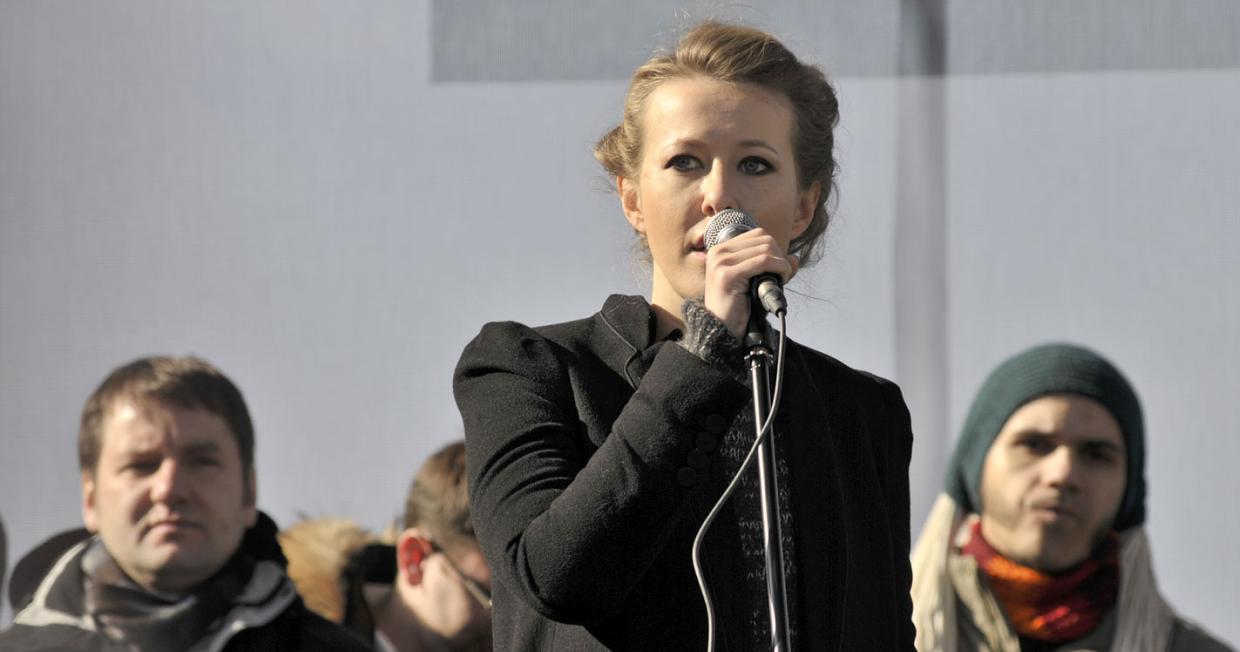
Stooge or Dissident? Ex-presidential candidate Sobchak flees Russia
Police detained Kirill Sukhanov, the commercial director of Sobchak’s media company, and Ariana Romanovskaya, the editor of one of Sobchak’s Telegram channels, on Tuesday. The following morning, they searched Sobchak’s home outside Moscow, although by that time she was already on her way to the border. State news agency TASS quoted a source who said that Sobchak bought plane tickets to both Dubai and to Turkey “to confuse our operatives.” As police officers waited for her to arrive at Moscow’s Vnukovo airport, Sobchak slipped out of the country through Belarus to Lithuania on an Israeli passport.

A video of Sobchak leaving Russia time stamped 13:38 soon emerged. State news agency RIA Novosti reported Sobchak’s departure just half an hour later, strongly suggesting that the security services knew exactly where she was and could have arrested her at any time.
In court later that day it emerged that Sobchak’s colleagues were being charged with blackmailing Sergei Chemezov, head of Rostec, the powerful state corporation that controls much of Russia’s defense industry. According to investigators, Sobchak’s colleagues demanded 11 million rubles ($175,000) from Chemezov in return for deleting compromising material from one of their Telegram channels and blocking further negative reports. If found guilty, Sukhanov and Romanovskaya face up to 15 years in jail.
Who is Ksenia Sobchak?
Daughter of former St. Petersburg governor Anatoly Sobchak, Ksenia Sobchak is one of the most famous and controversial figures in the Russian media. In the early 1990s, her father appointed Putin as his deputy in Petersburg. The current president’s loyalty to Anatoly Sobchak is well-known (one of Putin’s favorite boasts involves the tale of how he smuggled Sobchak out of Russia to avoid legal action in 1997). The same loyalty has long been thought to extend to Sobchak’s family, too. Putin is widely believed to be godfather to Ksenia, although she insists that he attended her christening merely as a guest.
In the mid-2000s, Sobchak presented Russia’s best-known reality show, Dom-2. Her luxurious lifestyle and family connections led to her being dubbed “the Russian Paris Hilton.” For those angry at the unearned wealth of the country’s elite, Sobchak became a hate figure.
In the early 2010s, Sobchak moved into politics amid the last genuine large-scale protests against Putin. In late 2017, Sobchak surprised everyone when she announced that she would stand for president. The only “liberal” candidate allowed onto the ballot paper, Sobchak’s candidacy attracted fierce criticism from other opposition leaders, particularly supporters of anti-corruption campaigner Alexei Navalny, who was not allowed to run. Sobchak was widely accused of running as a token opposition candidate.
Sobchak ultimately came fourth in the 2018 election with just 1.68% of the vote (Putin took 76.7%). Shortly afterwards, she was offered a job on state TV for the first time in eight years. Sobchak remained a full-time presenter for Channel 1 until last year.
Today, Sobchak’s media holding is her focus. It was set-up in 2018 with the launch of Ostorozhno, Sobchak — a YouTube channel. In 2021, she added a Telegram channel, Ostorozhno Novosti, which quickly became a popular news source.
Immediately after Russia invaded Ukraine, Sobchak announced her opposition to the war. Subsequently, her outlets continued to cover the war in depth, albeit cautiously. For example, her Telegram channel uses the official term “special military operation” for the war, and, in April, was largely silent about evidence of civilian killings by the Russian army near Kyiv.
Courting controversy
The criminal case involving Sobchak and her flight to Lithuania — a hub of exiled Russian dissenters — sparked derision from many. Supporters of Navalny immediately claimed it had been orchestrated by the Kremlin to give Sobchak credibility in opposition circles.
Exiled journalists largely refuse to see Sobchak as a comrade in arms. “I can’t describe this as pressure on the free press,” wrote former Ekho Moskvy presenter Alexander Plyushchev. And many opposition figures were outraged by a New York Times tweet describing Sobchak as “one of the best-known remaining critics of President Vladimir Putin.”
Editor-in-chief of independent media outlet Mediazona, Sergei Smirnov, had a less conspiracy-fuelled view. “It seems that Sobchak was one of the last who tried to keep a foot in both camps, but in 2022, that whole set-up went to hell,” he wrote.
Although there are many intriguing details in the story of Sobchak flight from Russia, most can be explained without resorting to conspiracy theories.
- The story that Sobchak managed to evade security forces by buying multiple plane tickets does not ring true. It’s likely that the authorities could have prevented her from leaving if they wanted to: the Kremlin usually prefers to put pressure on opposition figures based outside of Russia, rather than jailing them at home.
- The people behind the criminal case involving Sobchak had excellent relations with her until recently. Chemezov, who reported the alleged blackmail attempt, funded Sobchak’s 2018 election campaign; Vasily Brovko, head of Rostec’s PR, who has testified, is the husband and business partner of Sobchak’s one-time friend, TV presenter Tina Kandelaki. But this is hardly proof of a grand conspiracy. Chemezov was behind previous criminal cases against Telegram channel owners, who often earn money by publishing compromising information. It’s also possible that Chemezov, whom Putin has personally blamed for the Russian defense industry’s “modest results” since the start of the war, is starting to feel the heat. Perhaps he is trying to shed his old image as a patron to Russia’s liberals, which may have been an acceptable quirk prior to 2022, but is unacceptable in wartime.
Why the world should care
The “Sobchak case” is a good illustration of how the war is changing the relationship between the authorities and the elites. The nuances that permitted Putin’s goddaughter to attend protest rallies are gone.




